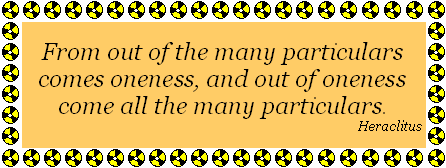|
In Search of the Quantum Mind
The empirical evidence deriving from quantum theory research has shown that at molecular, atomic, and sub-atomic levels, prior to observation, objects are composed of something indeterminate that is neither wave nor particle, is neither here nor there but is distributed 'who knows where' as a probability distribution that will materialize instantaneously at the behest of an observer. And it does so either as a wave or particle, or a conglomeration of particles depending upon the methodology of the observer.
In their indeterminate format of "neither wave nor particle," such objects may be distributed in, even throughout, the world of space-time, or alternatively, in a dimension beyond space-time that some refer to as "non-local."
Non-local is a zone, dimension, or whatever, in which time appears to be non-existent, a zone of reality that is instantaneously accessible on demand from within space-time.
The Brain-Mind as both a Quantum System and a Measuring Apparatus.
We look at the brain-mind's quantum system as a complex macro-quantum system consisting of many components.
We can represent the states of a complex quantum system by its so-called normal modes of excitation, its quanta, or more generally, by conglomerates of the normal modes. Suppose these normal modes represent mental archetypes of mental objects (much like Plato's shadows on the cave wall). Call these states of the brain's system pure mental states.
Suppose also that the bulk of the brain is the classical analogue of a measurement apparatus and this classical apparatus of the brain amplifies and records the quantum mind objects.
In this quantum model, the mental states are states of the quantum system which, with a measurement, become correlated with the states of its measuring apparatus.
Thus in every quantum event the brain-mind state that is collapsed and experienced represents a pure mental state that the classical brain measures, amplifies, or records.
The concept that most of the brain is simply a measuring apparatus leads to a new and useful way to think about the brain and conscious events.
So could it be that a quantum mechanism in our head opens the way for the supervention of non-local consciousness?
Definitive experimental evidence for a non-local quantum system in the brain-mind comes from Grinberg-Zyllerbaum and co-workers in which two subjects maintain their direct contact while each is in a Faraday cage at a distance from one another. When the brain of one responds to an external stimulus with an evoked potential, the other's brain also shows a potential, in form, similar to that evoked potential.
This is interpreted as an example of quantum non-locality due to correlation between two brain-minds that is established through their non-local consciousness.
Classical concepts about the brain-mind system mostly treat the brain itself as computer-like hardware with mind being the software. In the idealist model the mental states we experience are derived from the interaction of both the classical and quantum systems.
Importantly, in any individual the causal potency of the brain-mind quantum system arises from non-local consciousness that both collapses the mind's wave function and experiences the outcome. Objects appear from a transcendent domain of possibility into the domain of manifestation when non-local unitive consciousness collapses their wave function.
However for the collapse to be completed it must be in the presence of an awareness of the brain-mind in order that "measurement" is made. Thus we have a circularity situation--there is no completion of measurement without awareness, but there is no awareness without completion of measurement.
To see our way clear of this circularity we can apply quantum measurement theory to the brain-mind. According to von Neumann, the state of a quantum system changes in two ways. The first is by spreading as a wave to become a coherent superpositioning of all the allowed potential states. The second is a discontinuous change in state produced by a measurement
|
|



